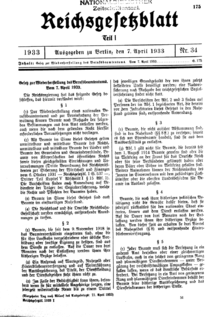
Back Gesetz zur Wiederherstellung des Berufsbeamtentums German Ley para la Restauración de la Función Pública Spanish Ammattivirkamieslaki Finnish Loi allemande sur la restauration de la fonction publique du 7 avril 1933 French חוק לשיקום שירות המדינה המקצועי HE Undang-Undang Pemulihan Kepegawaian Negeri Profesional ID



The Law for the Restoration of the Professional Civil Service (German: Gesetz zur Wiederherstellung des Berufsbeamtentums, shortened to Berufsbeamtengesetz), also known as Civil Service Law, Civil Service Restoration Act, and Law to Re-establish the Civil Service, was enacted by the Nazi regime in Germany on 7 April 1933. This law, which followed Adolf Hitler's rise to power by two months and the promulgation of the Enabling Act by two weeks, constituted one of the earliest instances of anti-Semitic and racist legislation in Germany.
The primary objective of the law was to establish a "national" and "professional" civil service by dismissing certain groups of tenured civil servants. Individuals of non-Aryan origin, particularly those of Jewish descent, were compelled to retire, while members of the Communist Party or affiliated organizations were to be terminated from their positions. Additionally, the law forbade Jews, non-Aryans, and political opponents from holding positions as teachers, professors, judges, or within the government. Its reach extended to other professions such as lawyers, doctors, tax consultants, musicians, and notaries. Initially, the law sought the dismissal of all non-Aryan civil servants, but subsequent amendments were introduced to exempt World War I veterans, individuals serving since August 1914, and those who had lost family members in the war.
This law represented a significant turning point for German Jewry, prompting notable figures such as Albert Einstein to resign and emigrate prior to being forcibly expelled. Another provision aimed to remove personnel deemed unreliable due to their political beliefs. The legislation defined Aryan lineage and established a distinction between Aryans and non-Aryans. It also included provisions for compulsory retirement and the requirement of providing evidence of Aryan ancestry. A series of related ordinances were issued to implement the law and introduce further regulations.
© MMXXIII Rich X Search. We shall prevail. All rights reserved. Rich X Search